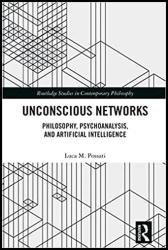Unconscious Networks: Philosophy, Psychoanalysis, and Artificial Intelligence
- Добавил: literator
- Дата: 20-10-2022, 12:18
- Комментариев: 0
 Название: Unconscious Networks: Philosophy, Psychoanalysis, and Artificial Intelligence
Название: Unconscious Networks: Philosophy, Psychoanalysis, and Artificial IntelligenceАвтор: Luca M. Possati
Издательство: Routledge;
Год: 2023
Страниц: 279
Язык: английский
Формат: pdf (true)
Размер: 19.7 MB
This book develops an original theoretical framework for understanding human-technology relations. The author’s approach, which he calls technoanalysis , analyzes artificial intelligence based on Freudian psychoanalysis, biosemiotics, and Latour’s actor-network theory.
How can we communicate with AI to determine shared values and objectives? And what, ultimately, do we want from machines? These are crucial questions in our world, where the influence of AI-based technologies is rapidly growing. Unconscious dynamics influence AI and digital technology and understanding them is essential to better controlling AI systems. This book’s unique methodology— which combines psychoanalysis, biosemiotics, and actor-network theory—reveals a radical reformulation of the problem of the human mind. Technoanalysis views the mind as a hybrid network of humans and nonhuman actants in constant interaction with one another. The author argues that human unconscious dynamics influence and shape technology, just as technology influences and shapes human unconscious dynamics. He proceeds to show how this conception of the relationship between the unconscious and technology can be applied to social robotics and AI.
Bostrom depicts a dark future for humanity. He believes that the creation of a super-intelligent AI system could lead to the extinction of humankind. The risk involved in the creation of a superintelligence is that it would be operating at a speed and scale unfathomable to humans. This could initiate an intelligence explosion on a digital timescale of a millisecond so powerful that it could accidentally or deliberately destroy humanity. Bostrom not only contemplates the possibility of malicious applications of AI—such as hacking military devices; creating nanofactories, which can be distributed in undetectable concentrations, that manufacture killing devices on command; and duping humans into doing the “dirty work”—but also envisions a scenario in which AI achieves world domination and humans are useful only as raw materials.
Unconscious Networks will appeal to scholars and advanced students interested in philosophy of technology, philosophy of artificial intelligence, psychoanalysis, and science and technology studies.
"Unconscious Networks is an ambitious and original contribution to both psychoanalysis and (philosophy of) artificial intelligence. Possati argues that we should return to a Freud initial view that psychoanalysis is part of the natural sciences. This is an original move and not only throws an interesting light on a somewhat forgotten (or surpressed) dimension of psychoanalysis, but it also enables Possati to establish a different connection between psychoanalysis and AI, especially by using Deacon as a biosemiotics link between those two domains. Probably his approach will be criticized both by critics that regard psychoanalysis as outmoded altogether, and by Lacanians and other representatives of the hermeneutic tradition in psychoanalysis. But I expect Unconscious Networks will also receive praise because of its innovative new approach to the connection of psychoanalysis and AI, both from the domain of psychoanalysis and of AI research." ~ Anonymous review
Скачать Unconscious Networks: Philosophy, Psychoanalysis, and Artificial Intelligence
[related-news] [/related-news]
Внимание
Уважаемый посетитель, Вы зашли на сайт как незарегистрированный пользователь.
Мы рекомендуем Вам зарегистрироваться либо войти на сайт под своим именем.
Уважаемый посетитель, Вы зашли на сайт как незарегистрированный пользователь.
Мы рекомендуем Вам зарегистрироваться либо войти на сайт под своим именем.
